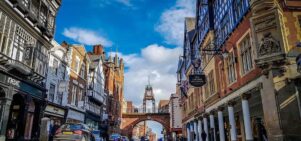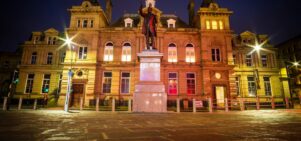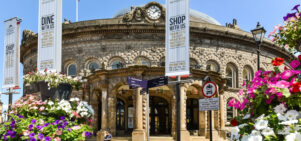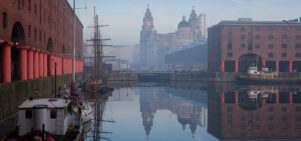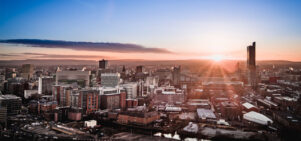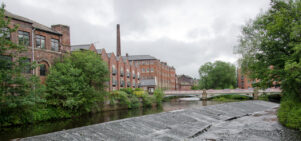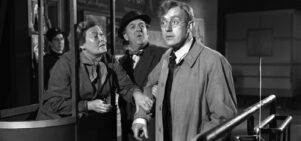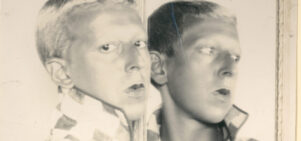A moment in the Marxist sun: Mark Boulos at FACT
Susie StubbsAn exhibition at Liverpool’s FACT gallery shows new video work – and some political ideas that keep on repeating.
The star of FACT’s current art show – and of this year’s short-run AND Festival – is a new film installation by the American artist, Mark Boulos. In it, the viewer steps into a circle of light and finds their ghostly doppelganger transported into the street scene in front of them. Traffic roars past. The occasional pedestrian walks up to a crossing, hesitates, and goes back the way they came. Nothing much happens. And then all of a sudden, time speeds up, the sky splits and it all goes a bit Doctor Who.
It is clever and engaging, the sort of thing that combines technology and, apparently, 19th-century “stage-magic illusion”. It is precisely the sort of dystopian artwork that a festival such as AND demands. Yet although it is good, what caught our attention most about the exhibition was not this particular work, but instead two accompanying, large-scale film works by the artist – loud, narrative-based chunks of video time that cover ideas as old as Marx.
“I want to show that capitalism is irrational,” says Boulos, an artist whose prior training as a documentary filmmaker is apparent in films that variously tell the story of Nigerian oil exploitation, the 2008 credit crisis and a Communist uprising in the Philippines. “We have the idea that it is materialistic and robs us of our spirituality, but actually it isn’t materialistic enough. It robs us of our understanding of the everyday materials and processes that surround us.”
Capitalism is irrational, and yet it isn’t materialistic enough
The example that Boulos gives of irrational capitalism in action is All That Is Solid Melts Into Air. The 2008 video work places two screens in opposition. On one, men describe the revolution they intend to initiate – to end oil exploitation in the Niger Delta – with zealous fervor. They punctuate their to-camera speeches with violent gesticulation, movements mirrored by the men on the screen opposite. Here, in place of terrorists, we see traders on the floor of the Chicago Mercantile Exchange, apparently captured during the first days of the credit crisis (“that’s why they’re freaking out,” says Boulos). Worlds apart, these two groups have one thing in common: the desire to control oil. Yet while those in the Niger Delta are reminded daily of its presence via vast pipelines and catastrophic pollution, most of us in the West barely register its role in our lives. “The work itself is a critique of the material of video art – it is made from plastic and electricity – and it reminds us that oil is everywhere, yet you never see it in its raw form,” says Boulos. In other words, we are so disconnected from the means of production that we have no idea where the raw materials of the things we use come from.
Oil aside, All That Is Solid is a peculiarly masculine work, saturated with testosterone; you can’t help but look at these angry young men and wonder how much more reasonable they might be if there were more women in the picture. It’s an idle thought, one almost immediately answered in No Permanent Address, a documentary that follows the New People’s Army. From a hide out in the Filipino jungle, we watch the conversion of two new recruits into an organization branded by governments worldwide as “terrorist”. Their acceptance into the NPA fold is overseen by the gentle, persistent questioning of a female leader, a process perhaps all the more shocking for its maternal air.
Keen-eyed readers will already have spotted that the title of Boulos’ first work is the same as that of Jeremy Deller’s latest exhibition. Neither artist has ripped off the other; both have taken the line from Karl Marx, from the Communist Manifesto that he wrote in Manchester in 1848. Marx provides a reference point for Art Sheffield, too – Joseph Beuys’ central artwork here is, on his instruction, surrounded by paintings produced during Marx’s lifetime, all the better to make the point about the (capitalist) value we ascribe to objects. And next month, an exhibition at Tate Liverpool takes an historic look at how left-leaning politics have influenced art for pretty much as long as anyone can remember.
This political art swell is slightly ironic. The economy is recovering. We are slowly clawing our way back up the cliff we dropped off sometime in 2008. Global revolution didn’t occur; we carry on pretty much as before. But it’s not ironic at all, of course. The same economic system that caused meltdown remains more or less intact, our belief in capitalism similarly so – which brings us neatly back to irrational behaviour. “The men I filmed in the Niger Delta have enormous courage, the courage to fight against an overwhelming force – because they believe they are bullet proof. It is a metaphysical belief, but in many ways mythology and religious belief are far more rational than the mythologies we create around capitalism,” says Boulos. We can’t help thinking he may be right. Or left, as it turns out.




